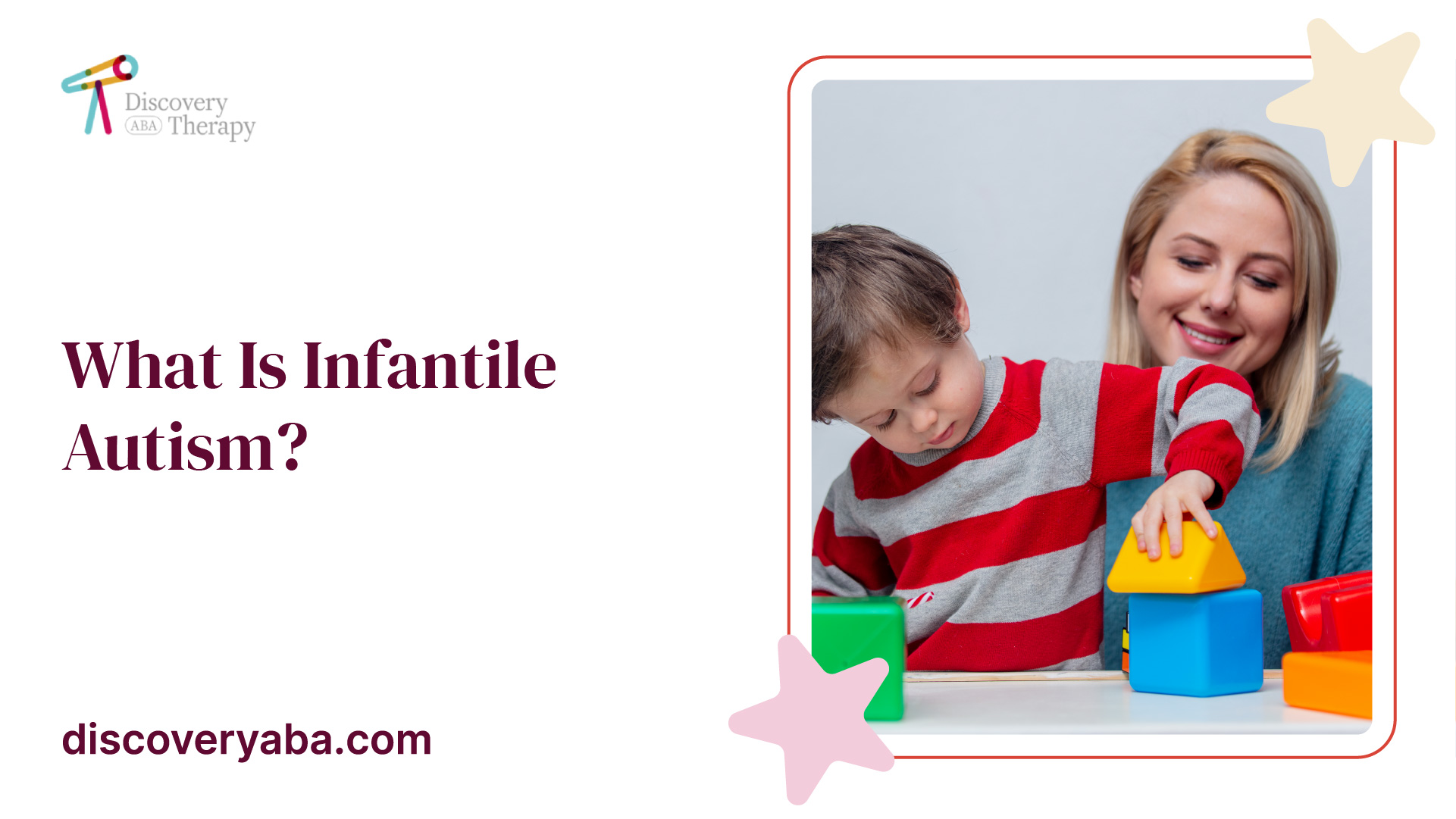What Is Infantile Autism?
Discover the heartfelt journey of infantile autism, understanding its impact on individuals and families. Gain insights into the unique challenges and strengths of those affected, and explore compassionate approaches to support and empowerment.
.jpeg)
Understanding Infantile Autism
Infantile autism, also known as autism spectrum disorder (ASD), is a developmental disorder that affects individuals from early childhood. It is characterized by a wide range of challenges in social interaction, communication, and repetitive behaviors.
What is Infantile Autism?
Infantile autism is a neurodevelopmental condition that typically appears in the first few years of a child's life. It is characterized by difficulties in social interaction, communication, and restricted or repetitive patterns of behavior. Individuals with infantile autism may have difficulty understanding and responding to social cues, making it challenging for them to form meaningful relationships with others.

Key Characteristics of Infantile Autism
The key characteristics of infantile autism can vary from person to person, but they generally include:
- Impaired Social Interaction: Individuals with infantile autism may struggle with social interactions, such as making eye contact, understanding nonverbal cues, and engaging in reciprocal conversations. They may have difficulty forming and maintaining relationships with peers and may prefer to be alone.
- Communication Challenges: Language and communication difficulties are common in infantile autism. Some individuals may have delayed speech development or may not develop verbal language at all. Others may have language skills but struggle with pragmatic language, understanding sarcasm or jokes, or engaging in back-and-forth conversations.
- Restricted and Repetitive Behaviors: People with infantile autism often engage in repetitive behaviors or have highly focused interests. They may display repetitive body movements (such as hand flapping or rocking), have a strong attachment to routines, and exhibit intense interests in specific topics.
- Sensory Sensitivities: Many individuals with infantile autism have sensory sensitivities. They may be hypersensitive or hyposensitive to certain sensory stimuli, such as sounds, lights, textures, or smells. These sensitivities can significantly impact their daily lives and may cause distress or discomfort.
The characteristics of infantile autism exist on a spectrum, meaning that the severity and combination of symptoms can vary widely among individuals. Early diagnosis and intervention are crucial in providing support and promoting the well-being of individuals with infantile autism.
Diagnostic Criteria
Infantile autism, also known as autism spectrum disorder (ASD), is a neurodevelopmental disorder that affects social interaction, communication, and behavior. To diagnose infantile autism, medical professionals refer to specific diagnostic criteria that help identify the presence of the disorder.
The diagnostic criteria for infantile autism are outlined in the Diagnostic and Statistical Manual of Mental Disorders (DSM-5), which is widely used by healthcare professionals. According to the DSM-5, the following criteria must be met for a diagnosis of infantile autism:
Persistent deficits in social communication and social interaction across multiple contexts:
- Deficits in social-emotional reciprocity, such as difficulty engaging in back-and-forth conversation or sharing of emotions.
- Deficits in nonverbal communication behaviors, such as eye contact, facial expressions, and body language.
- Deficits in developing, maintaining, and understanding relationships.
Restricted, repetitive patterns of behavior, interests, or activities:
- Stereotyped or repetitive motor movements, such as hand flapping or rocking.
- Insistence on sameness, resistance to change, or rituals and routines.
- Highly restricted interests that are abnormal in intensity or focus.
- Hyper- or hypo-reactivity to sensory input, such as being overly sensitive to sounds or textures.
Symptoms must be present in early childhood, typically before the age of three.
Symptoms cause clinically significant impairment in social, occupational, or other important areas of functioning.
The diagnosis of infantile autism requires a comprehensive evaluation by qualified medical professionals, including developmental pediatricians, child psychiatrists, or clinical psychologists experienced in diagnosing ASD. The evaluation typically involves a thorough assessment of the individual's developmental history, behavior, communication skills, and social interactions.
The Role of Medical Professionals in Diagnosis
Medical professionals play a crucial role in the diagnosis of infantile autism. They use their expertise to assess and evaluate individuals based on the diagnostic criteria outlined in the DSM-5. The diagnostic process usually involves:
- Gathering information: Medical professionals collect detailed information about the individual's developmental history, behavior, and any concerns raised by parents or caregivers.
- Observation and assessment: Through structured observations and assessments, medical professionals assess the individual's social interaction, communication skills, and behavior. They may use standardized assessment tools, questionnaires, and clinical interviews to gather information.
- Collaboration with other professionals: Medical professionals often collaborate with other healthcare providers, such as speech-language pathologists, occupational therapists, and educational specialists, to gather a comprehensive understanding of the individual's strengths and challenges.
- Diagnosis and communication: Based on the evaluation, medical professionals provide a diagnosis of infantile autism if the criteria are met. They also play a crucial role in communicating the diagnosis to the individual and their family, providing support, and guiding them towards appropriate interventions and resources.
The diagnostic process for infantile autism requires expertise and a multidisciplinary approach. By working closely with medical professionals, individuals and their families can receive an accurate diagnosis, leading to a better understanding of the condition and access to appropriate support and interventions.
Impact on Individuals and Families
Infantile autism can have a significant impact on both the individuals diagnosed with the condition and their families. Understanding the challenges faced by individuals with infantile autism and the impact on their families and caregivers is crucial for providing the necessary support and creating a nurturing environment.
Challenges Faced by Individuals with Infantile Autism
Individuals with infantile autism often face a range of challenges that can affect various aspects of their lives. These challenges may include:
- Social Interaction: Difficulties in social interaction and communication are common among individuals with infantile autism. They may struggle with understanding social cues, maintaining eye contact, and engaging in reciprocal conversations.
- Communication Skills: Language and communication difficulties are prevalent in infantile autism. Some individuals may have delayed language development, while others may have difficulty expressing their needs and emotions effectively.
- Repetitive Behaviors and Restricted Interests: Repetitive behaviors, such as hand-flapping or rocking, and rigid adherence to routines or specific interests are characteristic of infantile autism. These behaviors can impact daily functioning and may interfere with social interactions.
- Sensory Sensitivities: Many individuals with infantile autism experience sensory sensitivities, such as heightened sensitivity to light, sound, touch, or certain textures. These sensitivities can lead to discomfort, anxiety, or distress in various environments.
- Executive Functioning Challenges: Executive functioning difficulties, including organization, planning, and problem-solving skills, are often observed in individuals with infantile autism. These challenges can impact their ability to manage daily tasks and navigate complex situations.
Impact on Families and Caregivers
Infantile autism also has a significant impact on families and caregivers who provide support and care for individuals with the condition. Some of the common impacts include:
- Emotional and Psychological Strain: Caring for a child with infantile autism can be emotionally challenging for families. They may experience feelings of stress, frustration, and sadness due to the unique demands of caring for a child with special needs.
- Financial Burden: The costs associated with therapies, interventions, and specialized education for individuals with infantile autism can create a significant financial burden for families. Access to necessary resources and services may vary depending on geographical location and financial circumstances.
- Disruption of Daily Life: The demands of caring for a child with infantile autism can disrupt the daily routines and activities of the entire family. Balancing the needs of the individual with autism alongside other family commitments can be a juggling act for caregivers.
- Social Isolation: Families may experience social isolation due to the challenges of participating in community activities or facing difficulties in finding inclusive environments that accommodate the needs of individuals with infantile autism.
Support and understanding from professionals, communities, and support groups are essential to help individuals with infantile autism and their families navigate these challenges. By creating inclusive environments, building positive relationships, and providing access to resources and support, we can help promote the well-being and quality of life for individuals with infantile autism and their families.
Early Intervention and Treatment
When it comes to infantile autism, early intervention and treatment play a crucial role in promoting optimal development and improving outcomes for individuals with autism. Recognizing the signs and symptoms early on and providing appropriate interventions can make a significant difference in a child's life. Let's explore the importance of early intervention and the various types of therapies and interventions available.
Importance of Early Intervention
Early intervention refers to the provision of targeted services and support to children with autism at a young age, typically during the preschool years. The earlier the intervention begins, the better the chances of positive outcomes. Early intervention focuses on addressing the specific challenges and needs of children with autism, helping them develop essential skills and reach their full potential.
Research has shown that early intervention can lead to significant improvements in communication, social interaction, behavior, and overall cognitive development. It can also enhance adaptive skills and reduce the severity of symptoms associated with autism. Early intervention programs often involve a multidisciplinary approach, involving professionals from various fields, such as speech therapy, occupational therapy, and applied behavior analysis.
Types of Therapies and Interventions
There are several evidence-based therapies and interventions available for children with infantile autism. These therapies aim to improve communication skills, social interaction, behavior management, and overall functioning. The selection of specific interventions depends on the individual needs and strengths of the child.
Therapy/Intervention and Description
- Applied Behavior Analysis (ABA): ABA is a widely used therapy that focuses on teaching and reinforcing positive behaviors while reducing problem behaviors. It uses principles of learning and behavior to improve various skills such as communication, social interaction, and self-care.
- Speech Therapy: Speech therapy focuses on improving communication skills, including language development, articulation, and pragmatic language (social language) skills. It may involve individual or group sessions, depending on the child's needs.
- Occupational Therapy: Occupational therapy aims to enhance fine motor skills, sensory processing, and self-care abilities. It helps children develop the skills necessary for daily activities, such as dressing, feeding, and playing.
- Social Skills Training: Social skills training focuses on teaching appropriate social behaviors and interaction skills. It helps individuals with autism develop and maintain meaningful relationships with peers and family members.
- Picture Exchange Communication System (PECS): PECS is a visual communication system that uses pictures or symbols to assist individuals with autism in expressing their needs and desires. It can help improve communication and reduce frustration.
- Sensory Integration Therapy: Sensory integration therapy aims to help individuals with autism who have sensory processing difficulties. It involves activities that address sensory sensitivities and help individuals regulate their responses to sensory input.
Early intervention and access to appropriate therapies and interventions are vital for individuals with infantile autism. These interventions can significantly improve their quality of life, facilitate skill development, and provide support to families and caregivers. By focusing on early identification and intervention, we can help individuals with autism reach their full potential and lead fulfilling lives.
Supporting Individuals with Infantile Autism
Supporting individuals with infantile autism involves creating an inclusive environment, building positive relationships, and providing resources and support for families and caregivers.
Creating an Inclusive Environment
Creating an inclusive environment is crucial for individuals with infantile autism to thrive. It involves promoting acceptance, understanding, and accommodating their unique needs. Here are some key strategies for creating an inclusive environment:
- Education and Awareness: Increasing awareness and understanding of infantile autism among peers, teachers, and the community can foster empathy and acceptance.
- Visual Supports: Using visual aids such as schedules, visual cues, and social stories can help individuals with autism navigate their surroundings and understand expectations.
- Sensory Considerations: Being mindful of sensory sensitivities and providing sensory-friendly spaces or accommodations can help create a comfortable environment.
- Structured Routines: Establishing consistent routines and clear expectations can provide a sense of stability and reduce anxiety for individuals with autism.
Building Positive Relationships
Building positive relationships is essential for individuals with infantile autism to feel supported and connected. Meaningful connections can enhance their social skills and overall well-being. Here are some ways to foster positive relationships:
- Communication Strategies: Using clear and concise language, visual supports, and alternative communication methods, such as sign language or augmentative and alternative communication (AAC), can facilitate effective communication.
- Social Skills Training: Providing social skills training and opportunities for social interactions can help individuals with autism develop social competence and form meaningful relationships.
- Peer Support Programs: Encouraging peer support programs, such as buddy systems or social groups, can facilitate social inclusion and provide opportunities for interaction with neurotypical peers.
- Family Involvement: Involving family members in the individual's care and providing them with resources and support can strengthen the overall support system.
Resources and Support for Families and Caregivers
Families and caregivers play a crucial role in supporting individuals with infantile autism. Access to appropriate resources and support can help them navigate the challenges and provide the best care. Here are some key resources and support options:
Resource/Support and Description
- Autism Support Organizations: Organizations dedicated to supporting individuals with autism and their families, providing information, advocacy, and support services.
- Therapies and Interventions: Various therapies, such as applied behavior analysis (ABA), speech and language therapy, occupational therapy, and sensory integration therapy, can help individuals with autism develop skills and improve their quality of life.
- Parent Training Programs: Programs that provide parents and caregivers with guidance and training on managing behaviors, implementing strategies, and promoting the development of their child with autism.
- Support Groups: Support groups offer a safe space for families and caregivers to connect, share experiences, and learn from one another. They provide emotional support, advice, and a sense of community.
- Educational Support: Collaborating with educational professionals, such as teachers, special education programs, and Individualized Education Plans (IEPs), can ensure appropriate educational support and accommodations.
By creating an inclusive environment, building positive relationships, and providing resources and support, individuals with infantile autism can be empowered to reach their full potential, while families and caregivers receive the assistance they need along their journey.
Summary
It's essential to recognize that infantile autism isn't just a label or diagnosis; it's a deeply personal journey for each individual and their loved ones. It's about understanding and embracing the unique way in which autism manifests in early childhood, and the profound impact it has on a person's development and daily life.
By approaching infantile autism with empathy, patience, and a commitment to learning, we can create supportive environments that enable individuals to thrive and reach their full potential. Let's continue to foster understanding, acceptance, and inclusion for all those touched by infantile autism, celebrating their strengths and championing their journey with compassion and love.
Sources
Find More Articles
Contact us
North Carolina, Tennessee, Nevada, New Jersey, Utah, Virginia
New Hampshire, Maine
Massachusetts, Indiana, Arizona, Georgia
.avif)

































































%2520(1).jpeg)





























